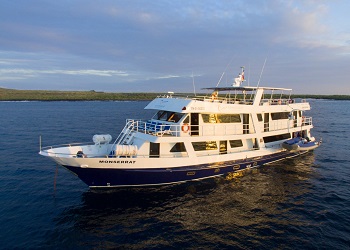Galapagos Legend Itinerary B - 5 days
ITINERARY B - 5 DAYS
THURSDAY
AM: Baltra: Arrival and transfer to boat
PM: Mosquera Islet (HK/SN/PR)
FRIDAY
AM: Santiago: Egas Port (HK/SN)
PM: Rabida (SN/PR/HK/KY)
SATURDAY
AM: Isabela: Urbina Bay (HK/SN)
PM: Isabela: Tagus Cove (SN/PR/HK/KY)
SUNDAY
AM: Fernandina: Espinosa Point (HK/SN/PR)
PM: Isabela: Vicente Roca Point (SN/PR)
MONDAY
AM: Santa Cruz: Highland (HK)
PM: Baltra: Transfer to the Airport
HK: HIKE / SN: SNORKEL / PR: PANGA RIDE / KY: KAYAK /
PB: PADDLE BOARD
DAY 1: THURSDAY
AM: BALTRA AIRPORT AND TRANSFER TO THE BOAT
Arriving in the Galapagos, passengers are picked up at the airport by our natural guides and taken to a ten-minute bus drive to the pier to board the M/V Galapagos Legend.
PM: MOSQUERA ISLET
This tiny, low lying islet, covered in coral sand, is set between North and South Seymour Islands. It is home to a group of sea lions that come to laze on the soft white sand. It is a good spot to observe shorebirds as well as herons, lava gulls and boobies. Snorkeling or diving here one can often see sharks, rays and barracudas.
DAY 2: FRIDAY
AM: SANTIAGO: EGAS PORT
The black volcanic sand sets this landing apart from most. It is best known for the dramatic shoreline where we meet a hosrabida sea leont of species that chose to live between land and sea. Particular among these are the endemic Galapagos fur seals which maintain a small colony at the end of our walk. Other species of note include American oystercatchers, sea lions, waders, herons, lava lizards and even Galapagos hawks. An optional visit takes us to an abandoned salt mine famous in its day for supplying salt to mainland Ecuador.
PM: RABIDA ISLAND
Lying at the heart of the archipelago this dramatic island, with its distinctive red-sand beach, is home to sea lions, mockingbirds, finches, endemic Galapagos doves and vermillion flycatchers. A walk takes us through a forest of palo santo and cacti to a beautiful overview of the bay.
Snorkeling here can be excellent, often with large schools of black-striped salemas, sea lions and the ubiquitous turtles.
DAY 3: SATURDAY
AM: ISABELA: URBINA BAY
At the far end of a long, level hike we arrive at a strange phenomenon where large blocks of coral lie completely exposed after a dramatic geological uplift in 1954. Located at the western base of Alcedo Volcano we hope to run into a few very impressive land iguanas v as well as some of the volcanoís endemic Galapagos giant tortoises during the wet season.
PM: ISABELA: TAGUS COVE
A well-known hideout and deep water anchorage in the days of pirates, Tagus Cove was also one of the few sites visited by Charles Darwin and the HMS Beagle in 1835. A beautiful hike leads us past an overview of Darwin Lake and on to a stunning volcanic revealing Isabela islandís dramatic northern volcanoes. Once back at sea level the perfect activity is to snorkel along a submerged wall with turtles, lots of fish, penguins and potentially flightless cormorants. You might even be tempted by a panga ride or kayak!
DAY 4: SUNDAY
AM: FERNANDINA: ESPINOSA POINT
The youngest island of Galapagos and one of the most pristine in the world. Fernandina is simply the ëmarine iguana capital of the worldí. This desolate volcanic backdrop is ome to a huge concentration of these enigmatic reptiles. Incongruously, sharing the same shoreline, we can find the diminutive Galapagos penguins. Here we also have the exciting opportunity to snorkel with marine iguanas feeding underwater, penguins, turtles and the bizarre, endemic, flightless cormorants.
PM: ISABELA: VICENTE ROCA POINT
This is a spectacular visitor site, surrounded by immense cliffs of the eroded volcano. Studded with resting sea birds such as brown noddies and Nazca boobies, we will enjoy them in close proximity from our dinghies. Snorkeling here is superb, with certain speciesnasca boobies animals of fish only found in the west of the archipelago. We also have a very real chance of swimming with penguins and potentially a plethora of green turtles.
DAY 5: MONDAY
AM: SANTA CRUZ: HIGHLANDS TORTOISE RESERVE
Dry landing. In the mountains of Galapagos is possible to admire different kind of birds, such as: tree and ground finches, vermillion flycatchers,tortoise animal 1 paint-billed crakes, yellow warblers, and cattle egrets (usually standing on the tortoises’ shell). The journey to the reserve offers great opportunities to see the contrasts that the island offers in reference to the variety of ecosystems.
The road goes from the coast through the agricultural zone and straight up to the dense humid forests. Often, Galapagos Giant Tortoises are also seen on the way, wandering through pastures in the paddocks. This spot is a birdwatchers’ haven, since almost every land bird present on the island lives or migrates here.
PM: BALTRA TRANSFER TO THE AIRPORT
After the visit, passengers will be transferred to the airport for their return flight to Guayaquil or Quito.







